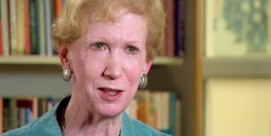In This Episode << SLIDE LEFT TO SEE ADDITIONAL SEGMENTS
Faith and Family in America — Analysis
Analysis
“Faith and Family in America” Survey
John C. Green
Senior Fellow, Pew Forum on Religion & Public Life
TYPES OF FAMILIES AND BELIEFS ABOUT FAMILIES
There are many types of families in the United States, and the survey shows the following types:
| Family Type | % Sample |
| Married couple, never divorced With children at home |
18.5% |
| Married couple, divorced With children at home |
4.6 |
| Unmarried person, with partner With children at home |
2.5 |
| Unmarried, no partner With children at home |
5.9 |
| Married couple, never divorced No children at home |
25.6 |
| Widowed person, No children at home |
7.5 |
| Married couple, divorced No children at home |
9.7 |
| Unmarried, no partner No children at home |
14.2 |
| Never married, No children at home |
11.5 |
| 100.0% |
Only 18.5% of families met the traditional nuclear family ideal: married, never divorced, with children at home.
Another 25.6% were married, never divorced, but with no children at home. Also another 7.5% are widowed persons with no children at home–mostly elderly.
If these three groups are combined 51.6% of Americans live in some type of “traditional” family (see bolded rows in the table above).
Put another way, about 48% of Americans live in households that depart dramatically from the ideal of the traditional family.
Nonetheless, 79.6% of all Americans agree that it is best for children if their parents are married, and 70.5% agree that traditional marriage is “God’s plan.” A majority of every type of family holds these views, although non-traditional families hold them to a lesser extent.
But Americans do recognize the decline of the traditional family in practice. For instance, 52% of families believe that divorce is often a good thing, and slightly less than one-half agree that married people are happier than non-married people, or that is it acceptable for couples to live together.
MORAL VALUES
When asked to name their most important concerns, 18% of the sample listed “moral values.” But when asked about the meaning of the term, just 10% of those who listed moral values named “social issues,” such as abortion or marriage, and another 35% mentioned “family values,” such as protecting children from sexual abuse. These two responses are often closely related in many people’s minds. However, the single largest response was “personal values,” such as honesty and responsibility, which accounted for 36% of the respondents.
It is worth noting that 26% of members of “traditional families” (married and never divorced with children at home) listed “moral values” as their most important concern. And interestingly, single never-married respondents without children were the second most likely group to list “moral values,” at 20%. When asked to define “moral values,” 37% of both groups picked either “social issues” or “family values.” But in both cases, the largest single category was still “personal values,” such as honesty and responsibility.
In addition, there are differences by family type on social issues. Half or more of the members of traditional families held pro-life views on abortion (ban abortions or restrict them substantially). In contrast, a majority of non-traditional families were pro-choice.
An even starker division appears on the legal status of marriage: more than 60% of traditional families favored marriage as a union between one man and one woman and not civil unions or same-sex marriage. Nontraditional families were more open to these alternatives, although same-sex marriage is not a plurality in any type of family.
TRADITIONAL FAMILIES AND THE WORSHIP ATTENDANCE GAP
Traditional families were more commonly found in some religious traditions and among weekly worship attenders within these traditions:
| All white Evangelical Protestants: | 55.6% | ||
| Weekly attending Evangelicals: | 59.8% | ||
| All white Mainline Protestants: | 58.4% | ||
| Weekly attending Mainliners: | 67.0% | ||
| All white Roman Catholics: | 55.4% | ||
| Weekly attending Catholics: | 58.1% | ||
| Entire sample | 51.6% | ||
VIEWS OF MARRIAGE AND RELIGION
There was also considerable variation in the views of marriage by religious tradition and weekly worship attendance. The following table presents the percent that agree with these views of marriage:
| Traditional Family God’s plan |
Acceptable for couples to live together |
Divorce is a sin |
|
| All white Evangelical Protestants: | 90% | 30% | 37% |
| Weekly attending Evangelicals: | 95% | 11% | 45% |
| All white Mainline Protestants: | 69% | 46% | 15% |
| Weekly attending Mainliners: | 83% | 23% | 20% |
| All white Roman Catholics: | 72% | 60% | 22% |
| Weekly attending Catholics: | 82% | 39% | 26% |
| Entire sample | 71% | 49% | 22% |
FAMILY TYPE, PARTISANSHIP, AND IDEOLOGY
The survey revealed some interesting variations in partisanship by family type:
| FAMILY TYPE | IDEOLOGY | TOTAL | ||||
| Democrat | (Independent) | Republican | (Other) | (DK/REF) | ||
| Married no divorce with kids at home | 29.2% | 10.7% | 47.1% | 8.1% | 4.8% | 100.0% |
| Married, divorced with kids at home | 44.4% | 12.1% | 32.1% | 9.7% | 1.6% | 100.0% |
| Partnered with kids at home | 46.9% | 13.4% | 20.8% | 6.2% | 12.7% | 100.0% |
| Unmarried, not partnered with kids at home | 47.3% | 12.2% | 25.4% | 6.2% | 8.9% | 100.0% |
| Married, no divorce, no kids at home | 26.1% | 25.1% | 38.6% | 7.3% | 2.9% | 100.0% |
| Widowed, no kids at home | 42.0% | 14.6% | 36.3% | 2.7% | 4.4% | 100.0% |
| Married, divorced, no kids at home | 36.2% | 10.8% | 31.3% | 14.0% | 7.7% | 100.0% |
| Unmarried no kids at home | 44.0% | 12.5% | 28.9% | 10.9% | 3.7% | 100.0% |
| Never married no kids at home | 40.8% | 17.5% | 28.8% | 8.7% | 4.2% | 100.0% |
| Entire Sample | 35.7% | 16.0% | 35.3% | 8.4% | 4.6% | 100.0% |
Traditional families tend to be more Republican than the sample as a whole (see underlined entries in the above table). In contrast, the nontraditional families tend to be more Democratic (see italicized entries). In part, this pattern reflects the effects of religion (traditional families are more likely to be evangelicals and weekly attenders). However, it may also be because the GOP has catered to traditional families, and the Democrats have catered to other kinds of households.
However, there is not as much difference by ideology.
| FAMILY TYPE | IDEOLOGY | TOTAL | |||
| Conservative | Moderate | Liberal | (DK/REF) | ||
| Married no divorce with kids at home | 43.6% | 35.1% | 15.1% | 6.1% | 100.0% |
| Married, divorced with kids at home | 40.1% | 25.3% | 34.6% | 0.0% | 100.0% |
| Partnered with kids at home | 25.0% | 29.9% | 36.5% | 8.5% | 100.0% |
| Unmarried, not partnered with kids at home | 37.6% | 24.3% | 29.0% | 9.1% | 100.0% |
| Married, no divorce, no kids at home | 40.8% | 32.2% | 23.0% | 4.0% | 100.0% |
| Widowed, no kids at home | 46.3% | 35.0% | 16.2% | 2.6% | 100.0% |
| Married, divorced, no kids at home | 42.4% | 30.8% | 25.2% | 1.6% | 100.0% |
| Unmarried no kids at home | 40.1% | 29.5% | 26.2% | 4.2% | 100.0% |
| Never married no kids at home | 32.2% | 35.7% | 26.6% | 5.6% | 100.0% |
| Entire Sample | 40.2% | 32.0% | 23.3% | 4.5% | 100.0% |
Non-traditional families tended to be more liberal than the sample as a whole, while traditional families tended to be conservative, albeit to a lesser extent (see bold entries).







